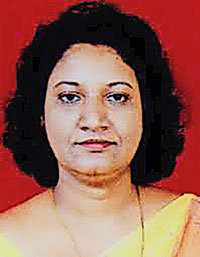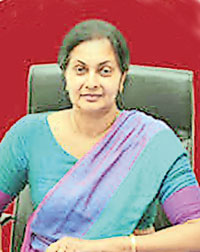News
SL looking at finer points to get vaccine against COVID-19
- Preliminary application for vaccine sent to COVAX
- 3 sub-committees under the direction of Additional Secretary (Public Health Services) Dr. Lakshmi Somatunga to deal with ‘prioritization’, ‘financing’ and ‘logistics’
Sri Lanka is currently working out the finer points with regard to securing a vaccine against COVID-19, after submitting the preliminary application through COVAX about a month ago, the Sunday Times learns.
Guided by the Epidemiology Unit which handles the vaccine and immunization policy of the country under a powerful and independent Advisory Committee on Communicable Diseases, three sub-committees have been set up to look into securing a vaccine under the direction of the National Coordinator for COVID-19 Vaccines, Dr. Lakshmi Somatunga.

Dr Lakshmi Somatunga
These three technical sub-committees are looking into the ‘identification and prioritization’ of the target group for the vaccine; the ‘maintenance of the cold chain and logistics’; and costing; said Dr. Somatunga who is also Additional Secretary of Public Health Services.
She said that Sri Lanka had sent an ‘expression of interest’ to COVAX has been assured that “we are in”. As such, the country would get 20% (for 4.2 million of its 21 million population) of its vaccine requirements.
COVAX (COVID-19 Vaccine Global Access) is a global initiative aimed at working with vaccine manufacturers to provide countries worldwide equitable access to safe and effective vaccines, once they are licensed and approved. COVAX is co-led by GAVI (Vaccine Alliance); the Coalition for Epidemic Preparedness Innovations and the World Health Organization (WHO).
Dr. Somatunga, however, cautioned against rushing into getting a vaccine as Sri Lanka should look into not only efficacy but as importantly at safety as well. Usually, it takes about 5-10 years to manufacture a vaccine, with the vaccine against Ebola taking about five years. When a vaccine is fast-tracked we need to be careful as efficacy and safety are of paramount importance.
Pointing out that Sri Lanka has built its strong Expanded Programme of Immunization (EPI) on the basis of a vaccine being prequalified by the WHO and approved by the Food and Drug Authority (FDA) of the United States of America, she said “we should await the findings of the Phase 3 trials of the vaccines before making any decisions. People who are getting the vaccines in other countries are part of the Phase 3 trials – they are like guinea pigs on whom these safety trials are being done”.
Just because others are getting the jab, we should not rush into it, said Dr. Somatunga, adding that meanwhile Sri Lanka is not idling but doing the necessary ground work.
Looking at the vaccines in the pipeline, she said that the Pfizer and Moderna vaccines need extreme cold for their storage and may not be suitable for Sri Lanka, but they were looking at the Oxford University-AstraZeneca and Russian Sputnik vaccines.
She urged all Sri Lankans to keep practising the universal health precautions of hand-hygiene, wearing face masks and social distancing to control COVID-19.

Dr.Susie Perera
There is no move to procure the vaccine directly from any manufacturer, it is learnt, with all officials reiterating that it is strongly advisable to await endorsement by the WHO of any vaccine against COVID-19. So far, NO vaccine against COVID-19 has been endorsed by the WHO.All decisions with regard to which vaccine the country should get and at what price would be decided thereafter.
On the side of logistics, the Deputy Director-General (Public Health Services II), Dr. Susie Perera who is on that sub-committee said that they are looking into the cold chain requirement because most of the vaccines being producedneed very cold (minus) temperatures. So the vaccines which have to be stored at -70°C may not be practical for Sri Lanka.
“We are thinking of the 2-8°C and -20°C vaccines,” she said, explaining that the 2-8°C one seems to be the future. “With any vaccine against COVID-19, we are still in the infancy stage. But if you take good vaccines, a temperature just a bit colder than room temperature is far better, because you can keep it. The efficacy won’t be harmed due to temperature.”
Pointing out that the trend globally is to make the vaccine not lose its potency at relatively normal temperatures, she said vaccines which can be kept at 2-8°C may be an option as Sri Lanka’s cold chain is compatible with them.
When asked about the allocation of 20% of a vaccine through COVAX, Dr. Perera said that it would cover around 4.2 million (of 21 million) people. Then Sri Lanka has to consider who among this groupneeds to be protected. This would include frontline workers (maybe about 1 million) and those above 60 years of age (around 13% of the population). Later the country would have to decide how the balance 6-7% of the vaccine would be administered.
“There could be safety issues and we are not sure of the side-effects either, so I do not think we should give it to our very young,” she added.
Experts in the field said that getting down any vaccine to Sri Lanka is a policy decisioncarried out on the advice of the Advisory Committee which is chaired by the Director-General of Health Services and has as its Secretary, the Chief Epidemiologist, who is armed with technical knowledge.

